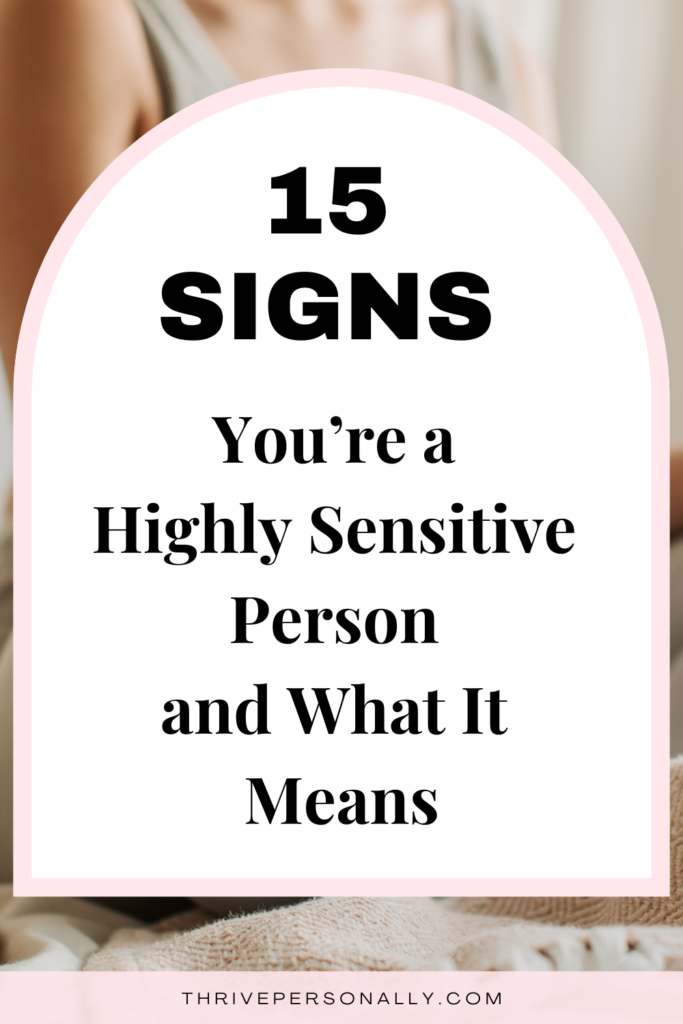A Highly Sensitive Person (HSP) is someone who possesses a heightened level of sensitivity to external stimuli and internal experiences. This trait is not merely about being easily overwhelmed; rather, it encompasses a profound awareness of emotions, both your own and those of others.
You may often feel overwhelmed in busy environments such as crowded places or loud gatherings, as your brain processes information more deeply than others. This characteristic is a result of a sensitive nervous system that allows for a rich inner life but can also lead to fatigue and anxiety.
Research indicates that approximately 15-20% of the population identify as HSPs, a trait that can span various cultural and geographical backgrounds. Among the traits that make HSPs unique are empathy, intense emotional responses, and a keen perception of subtleties in the environment.
You might find yourself noticing small details—a change in someone’s tone of voice or a shift in the atmosphere of a room—that others simply overlook. This heightened sensitivity can manifest in various ways, such as a deep appreciation for art or nature, and a tendency to feel deeply affected by media or news.
While being a highly sensitive person can present challenges, it also comes with its own set of strengths. You possess the ability to nurture relationships and create meaningful connections due to your empathetic nature. However, it is essential to understand how this trait may impact your daily life, including your work, relationships, and personal well-being.
Being aware of your sensitivity can help you navigate social situations more effectively and allow you to harness your unique qualities positively. As we delve deeper into the signs of being an HSP, this foundational understanding will assist you in recognizing and embracing your unique sensitivities.
15 Signs You’re a Highly Sensitive Person and What It Means
1. You Feel Things Deeply
When something happens, whether good or bad, you feel it deeply in your heart. A kind word can make your whole day, while a harsh comment might linger in your mind for weeks. This emotional depth is one of the hallmarks of a Highly Sensitive Person. It’s not just about being emotional; it’s about experiencing life’s moments with a profound intensity that others might not fully understand.
This depth can be both a strength and a challenge. It allows you to form deep connections with people and experiences, but it can also make you vulnerable to emotional exhaustion if you don’t take time to recharge. To manage this, try keeping a journal to process your feelings and use mindfulness techniques to stay balanced when emotions run high.
Read Also: How Validate Yourself and Stay Centered (8 Easy Steps)
2. You Get Overwhelmed by Crowds and Noise

Do you find busy places like shopping malls or crowded events exhausting? As an HSP, your senses are more finely tuned, so loud noises, bright lights, or chaotic environments can quickly become overwhelming. Your heightened sensitivity means you’re processing more information from your surroundings, which can lead to sensory overload.
To cope with this, you might prefer quieter, calmer settings where you can think and breathe easily. Recognizing this need isn’t about avoiding life’s challenges but about respecting your limits and creating spaces that support your well-being. For instance, carrying noise-canceling headphones or finding small breaks during a hectic day can make a significant difference.
Read Also: Feeling Overwhelmed? 8 Practical Ways to Regain Your Balance
3. You’re Highly Aware of Other People’s Emotions
You can often sense how someone is feeling, even if they don’t say a word. This emotional attunement makes you incredibly empathetic and compassionate, often acting as a source of comfort for those around you. However, this awareness can also be overwhelming, especially if you’re constantly absorbing other people’s stress or sadness.
Learning to set emotional boundaries is crucial. While your empathy is a gift, it’s essential to ensure you don’t neglect your own emotional needs while caring for others. Try visualizing a protective barrier around yourself to prevent emotional overload or practice self-check-ins to understand your own feelings better.
4. You Notice Details Others Miss
Whether it’s the slight change in someone’s tone, the way sunlight hits a flower, or the subtle scent of a room, you notice the little things. Your keen observation skills allow you to appreciate the beauty in everyday life, but they can also lead to overthinking.
For example, you might replay conversations in your mind, analyzing every word and gesture. While this attention to detail can enhance your creativity and problem-solving skills, it’s essential to practice mindfulness to prevent it from becoming overwhelming. Focusing on the present moment and letting go of unnecessary analysis can help you channel this trait positively.
Read Also: How to Handle Challenges in Tough and Confusing Times
5. You Need Time to Recharge After Socializing
Even if you enjoy spending time with friends or family, you might feel drained afterward. As an HSP, social interactions require more energy because you’re processing everything so deeply. The conversations, emotions, and environment all demand your attention, leaving you mentally and emotionally tired.
This doesn’t mean you dislike being around people; it simply means you need quiet alone time to recharge and regain your balance. Taking breaks and setting limits on social activities can help you maintain your energy. Make self-care rituals, like meditating or enjoying a solo hobby, a regular part of your routine.
6. You’re Easily Moved by Art and Beauty
A beautiful painting, a heartfelt song, or a touching movie can bring you to tears. Your sensitivity allows you to connect deeply with creative works, making them even more meaningful. This emotional connection can be a source of great joy and inspiration.
For you, art isn’t just something to look at or listen to; it’s an experience that resonates with your soul. This connection can also extend to nature, architecture, or even simple moments of beauty in everyday life.
Embracing this aspect of yourself can bring you immense fulfillment. Consider dedicating time to explore or create art to nourish this part of your soul.
7. You’re Sensitive to Criticism
When someone criticizes you, it can feel like a punch to the gut. You might replay the words in your mind over and over, wondering what you did wrong. This sensitivity isn’t about being weak; it’s because you take things to heart and care deeply about how you’re perceived. While constructive feedback can help you grow, it’s important to separate helpful advice from unnecessary negativity. Practicing self-compassion and reminding yourself of your strengths can help you navigate criticism more effectively. Try reframing critiques as opportunities to learn and grow while maintaining your confidence.
8. You Avoid Violent or Disturbing Content
Watching a scary movie, hearing about bad news, or seeing someone argue can affect you deeply, leaving you anxious or upset for days. This isn’t because you’re overly sensitive; it’s because your brain reacts more strongly to negative stimuli. Choosing what you expose yourself to is a form of self-care. It’s okay to avoid things that disturb your peace of mind. Instead, focus on content that uplifts and inspires you, helping you maintain a positive outlook on life. Consider creating a go-to list of comforting books, shows, or activities to turn to when you need positivity.
9. You’re Deeply Connected to Nature
A walk in the park, the sound of waves, or the sight of a sunset feels like pure therapy for your soul. Nature’s beauty and calmness resonate with you on a deep level, making it one of the best ways for you to relax and recharge. This connection isn’t just about enjoying the outdoors; it’s about feeling a profound sense of peace and belonging in natural environments. Spending time in nature can help you find balance and clarity, especially during stressful times. Even small actions, like tending to houseplants or opening a window to feel the breeze, can strengthen this connection.
10. You’re a Deep Thinker
You often reflect on life’s big questions, like the meaning of happiness or the best way to help others. Your depth of thought allows you to see the world in unique and meaningful ways, but it can also lead to overthinking. For instance, you might dwell on past mistakes or worry about future scenarios. While this depth of thought is one of your strengths, it’s important to practice mindfulness and focus on the present moment to avoid becoming overwhelmed by your thoughts. Balancing reflective time with active engagement in the present can enhance your well-being.
11. You Feel Physically Sensitive
Certain fabrics might feel itchy, or you might be particularly sensitive to temperature changes. Your heightened sensitivity extends to your physical senses, which can sometimes make you uncomfortable in certain situations. For example, strong smells, bright lights, or even crowded spaces might leave you feeling drained. Paying attention to your physical comfort and making adjustments, like wearing soft clothing or using dim lighting, can help you feel more at ease. Listening to your body’s signals and honoring your physical needs can significantly improve your daily experiences.
12. You Have a Rich Inner Life
Your imagination is vivid, and your thoughts are always running. You might enjoy daydreaming, journaling, or losing yourself in a good book. This rich inner world is a source of creativity and comfort for you. It’s where you process your emotions, explore your ideas, and find inspiration. While this inner life is a wonderful gift, it’s also important to stay connected to the present moment and balance your internal reflections with external experiences. Setting aside specific times for creative expression can help you nurture this part of yourself.
13. You’re Deeply Affected by Other People’s Energy
Have you ever walked into a room and instantly felt the mood? As an HSP, you’re highly attuned to the energy of those around you. If someone is angry, anxious, or upset, you might feel it as if it’s your own emotion. This sensitivity allows you to empathize deeply, but it also means you need to protect yourself from absorbing negativity. Practicing grounding techniques, like deep breathing or visualization, can help you stay centered in these situations. Creating personal rituals, like taking a moment to reset after intense interactions, can also help you manage this sensitivity.
14. You Struggle with Decision-Making
Because you analyze every option in great detail, even small decisions can feel overwhelming. You worry about making the wrong choice and often consider how your decision will affect others. While this thoughtfulness is a strength, it’s important to trust yourself and remember that no decision is perfect. Giving yourself permission to make mistakes and learn from them can help ease the pressure. Breaking decisions into smaller steps or setting time limits for making choices can help you navigate this challenge more confidently.
15. You’re Highly Intuitive
Your gut feelings are often spot-on. You have a natural ability to sense when something feels right or wrong, even if you can’t explain why. This intuition is one of your greatest gifts, helping you navigate relationships, opportunities, and challenges. Trusting your instincts can guide you toward decisions that align with your values and well-being. However, balancing intuition with logic is key to making well-rounded choices. Strengthening your intuition through practices like meditation or journaling can help you harness its power.
Understanding High Sensitivity
Being highly sensitive means that you experience the world around you in a more intense and profound manner than others. This trait, often referred to as High Sensitivity, affects approximately 15 to 20 percent of the population.
As a highly sensitive person (HSP), you might find yourself experiencing deep emotions and heightened reactions to stimuli such as sounds, lights, and even social interactions. This sensitivity is not a disorder; rather, it is a personality trait that reflects the way your brain processes information.
As someone who identifies as highly sensitive, you likely have a rich inner world and possess the ability to notice subtleties that others might miss. This acute awareness can manifest as empathy towards others, leading you to be a compassionate friend or partner.
Your deep emotional responses can inspire creativity, making you more attuned to beauty, art, and music. However, this ability can also pose challenges, such as feeling overwhelmed in busy environments or experiencing emotional exhaustion from absorbing the feelings of those around you.
Recognizing and accepting your highly sensitive nature is crucial for personal growth. You may face societal pressures to conform to a less sensitive mindset, which can lead to feelings of frustration or confusion. Embracing your sensitivity allows you to channel your strengths effectively and address your challenges.
Save the pin for later



